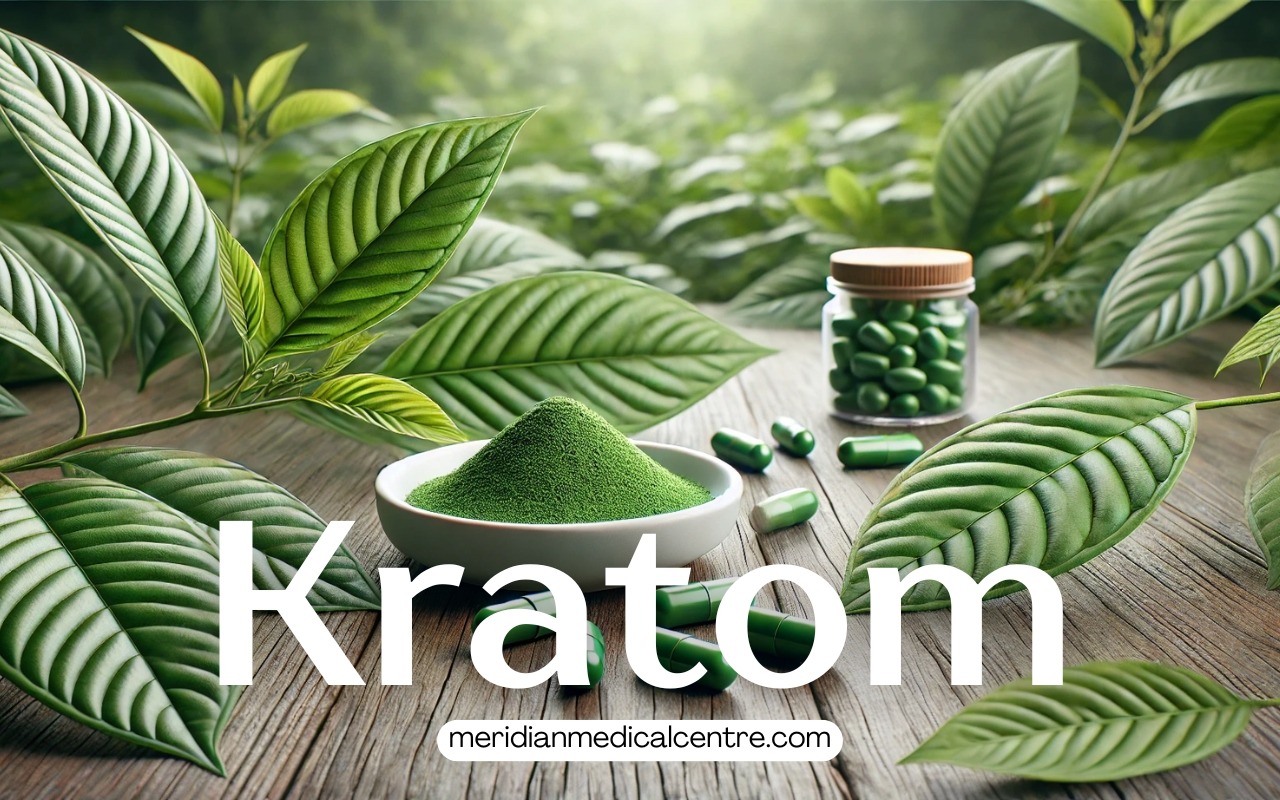
As the interest in natural wellness solutions continues to grow, kratom (Mitragyna speciosa) has emerged as a widely discussed botanical with potential benefits in pain relief, mood enhancement, and stress management. However, its effects on cardiovascular health and overall wellness remain a subject of ongoing research. Understanding the science behind kratom’s active compounds and how they interact with the body is essential for making informed health decisions.
At Meridian Medical Centre, we provide an evidence-based approach to wellness content is designed to empower individuals with accurate, research-backed health information.
Understanding Kratom’s Active Compounds
Kratom contains over 40 bioactive compounds, with mitragynine and 7-hydroxymitragynine being the most extensively studied. These alkaloids interact with opioid receptors, adrenergic pathways, and cardiovascular systems, influencing both the nervous system and heart function.
1. Mitragynine: The Primary Alkaloid
- Acts as a partial opioid receptor agonist, contributing to pain relief without the respiratory depression seen in opioids.
- Influences noradrenergic and serotonergic systems, potentially enhancing focus and mood.
- May cause vasoconstriction, affecting blood pressure regulation.
2. 7-Hydroxymitragynine: A More Potent Alkaloid
- Demonstrates strong analgesic properties, beneficial for chronic pain management.
- Impacts dopaminergic activity, potentially influencing relaxation and mood.
- Carries an increased risk of cardiovascular effects, such as elevated heart rate at high doses.
3. Additional Alkaloids and Their Effects
- Speciociliatine and Corynantheidine: Partial opioid antagonists that may help regulate kratom’s effects.
- Rhynchophylline: Thought to possess antihypertensive and anti-inflammatory properties, potentially supporting cardiovascular health.
- Isopteropodine and Mitraphylline: Studied for possible immune-boosting and neuroprotective benefits.
Kratom’s Impact on Cardiovascular Health
1. Blood Pressure and Circulation
- Low to moderate doses (1-5g): May lead to mild vasodilation, promoting circulation and relaxation.
- High doses (>10g): Can cause vasoconstriction, potentially increasing blood pressure in some individuals.
- Individuals with hypertension or pre-existing heart conditions should monitor their blood pressure when using kratom.
2. Heart Rate and Arrhythmias
- Some users report an increase in heart rate (tachycardia), particularly at higher doses.
- Possible reasons include kratom’s stimulatory effects on the adrenergic system and potential interference with calcium channel regulation, affecting heart rhythm.
- Those with arrhythmias or cardiovascular disease should exercise caution.
3. Risk of Cardiovascular Strain
- Long-term or excessive kratom use may lead to chronic vasoconstriction, affecting circulation.
- Some studies suggest kratom could contribute to increased LDL (“bad” cholesterol) levels.
- Potential for dependency may lead to lifestyle changes that impact cardiovascular health.
Kratom’s Role in Holistic Wellness
1. Stress Reduction and Mood Balance
- Kratom’s interaction with dopamine and serotonin receptors may promote relaxation and emotional well-being.
- Some individuals report benefits in reducing anxiety and managing stress.
2. Pain Relief and Muscle Recovery
- Kratom’s analgesic properties may aid in managing chronic pain, arthritis, and post-exercise soreness.
- May support muscle relaxation and faster recovery following strenuous physical activity.
3. Cognitive Support and Focus Enhancement
- Low doses of kratom may enhance alertness, concentration, and motivation.
- Some strains are used as natural nootropics, supporting memory retention and mental endurance.
Also Read: What Science Says About Red, Green, and White Veins
Best Practices for Safe Kratom Use
1. Dosage Considerations
- Low doses (1-3g): Best for energy, focus, and mild pain relief.
- Moderate doses (3-7g): May assist with pain management and relaxation without excessive sedation.
- High doses (>7g): Should be avoided for daily use, as they may increase sedation, blood pressure, and dependency risks.
2. Choosing the Right Kratom Strain
- White vein kratom: More stimulating, which may increase heart rate.
- Green vein kratom: Balanced effects, suitable for moderate pain relief and focus.
- Red vein kratom: More sedative, which may help with stress relief but could lower blood pressure.
3. Hydration and Nutritional Support
- Drink plenty of water to counteract dehydration and electrolyte imbalances.
- Consume potassium- and magnesium-rich foods to support heart function.
- Incorporate antioxidant-rich foods to combat oxidative stress.
4. Monitoring for Side Effects
Signs of cardiovascular strain to watch for include:
- Irregular heartbeat or palpitations.
- Dizziness or fainting.
- Persistent high blood pressure or headaches.
- If these symptoms occur, users should adjust their dosage, select a different strain, or discontinue use.
The Future of Kratom Research in Heart Health and Wellness
As kratom use expands, further research is needed to understand its long-term impact on cardiovascular health. Key areas of study include:
- Clinical trials on kratom’s role in blood pressure and heart function.
- Assessing oxidative stress and heart disease risks in long-term users.
- Developing standardized dosing guidelines for safer consumption.
Conclusion: A Balanced Approach to Kratom and Wellness
Kratom offers potential benefits for energy, focus, and pain relief, but its cardiovascular effects require careful monitoring. Responsible use, proper dosing, and awareness of individual health conditions are key to minimizing risks.
At Meridian Medical Centre, our commitment to evidence-based healthcare ensures that individuals receive accurate and transparent information regarding their wellness choices. Based on current research:
- Kratom may support stress relief, focus, and pain management, but those with heart conditions should consult a physician before use.
- Proper hydration, nutrition, and dosage control are essential for safe kratom consumption.
- More research is needed to fully understand kratom’s long-term effects on heart health.
For individuals seeking natural wellness solutions, kratom may be a complementary tool when used responsibly. However, always consult a healthcare professional before incorporating it into your health regimen, especially for those with pre-existing cardiovascular conditions.
Also Read: Unregulated Kratom Use in the Opioid Era: A Wellness Perspective on Safety and Efficacy